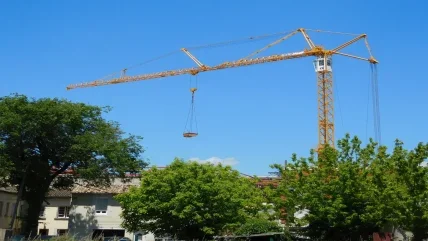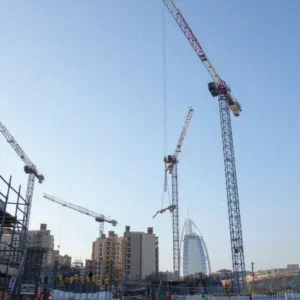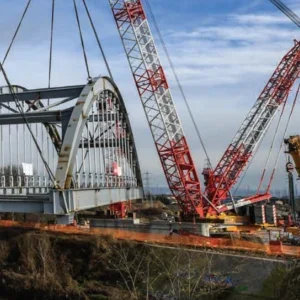
Altay Coskunoglu’s company, Tekno Insaat Makinalari Ticaret (Tekno) has been selling cranes—alongside asphalt and construction materials—for more than twenty years. “It will be our 22nd year as a business in 2008; we were founded in 1986, and started in cranes in 1987,” he says.
The company developed a crane sales business, from its origins selling Cadillon self-erectors, to become the Turkish distributor for Potain. It has built on this, with a rental arm that works around the world: “In 1998, we started a tower crane rental business, Teknovinc. We’re now the country’s largest, with a fleet of 55 tower cranes, all of them Potains. We go wherever Turkish contractors go.”
Ersan Öztuna’s business, Karun, focuses on crawler sales. He set the firm up in 1998 with Murat Molva, as an engineering and consulting company, based in Ankara. Starting in 1990s, the firm acquired a number of dealers, and established itself as an international distributor and consultancy. The company is the exclusive distributor in the region for crane manufacturers Manitowoc and Grove (deals that it signed separately, before the American firms merged), and other lifting-related suppliers such as Wylie and Goldhofer.
Coskunoglu explains that Turkish businesses have learnt to look overseas for work: “Public spending on construction projects by the state in Turkey is not stable: it can change a lot from year to year. Turkish contractors have had to adapt to this, and be active on the international scene. They now work in Russia, Central Asia, the Balkans, and Middle East: wherever there’s a public tender in one of these countries, there will be three, four, five Turkish contractors in the bidding. A lot of Turkish contractors are working in the central Asian ‘Turkish republics’. Turkish contractors, and Teknovinc, work from Afghanistan to Morocco, and from Sudan to Russia and Ukraine. There’s substantial numbers of Turkish contractors in the European sector of Russia, and in Moscow in particular.”
Figures from the Turkish under-secretariat for foreign trade show revenues from contractors working overseas near doubling every year between 2002 and 2005, from $1.6bn in 2002 to $7.4bn in 2005. The Engineering News Record’s list of the top 225 global contractors by foreign business for 2007 features 22 Turkish contractors, including Enka at 44 with foreign revenues of $1.192m, Renaissance at 61 with revenues of $782.4m and Gama at 64 with revenues of $725.2m. Tekno works closely with Enka, Coskunoglu says, “They’re one of the biggest contractors in Turkey, and work worldwide. They have a lot of joint ventures with Bechtel, based in California. They’re also one of the main property developers in Moscow. We supply all of their tower cranes and all of the technical services they need. They’re working on projects in Romania, Albania, Croatia, and the Balkans—we’ve supplied at least forty cranes for all of these projects, with some of the cranes going up to 350m in height.”
One of the key sources of demand for Turkish contractors and crane firms are the central Asian republics, with which modern Turkey shares ancient links. Coskunoglu says, “The Turks have historical and language links with central Asia: the Turkish people came from this part of the world a thousand years ago. With the Iron Curtain coming down, it’s like meeting with long lost relations.”
Öztuna agrees: “We come from the same roots: we speak the same language, just different dialects. My first time in Kazakhstan, I thought they were talking Russian, but after a couple of days I could understand that it was only a different dialect. They speak the old, pure, Turkish. They’re also the same religion: they’re Muslims, but secular like us, not fundamentalists. We’re the same people.”
Öztuna continues, “Business there is very much governed by people from Turkey. One of the ministers in Turkmenistan is a successful Turkish businessman who runs a big contracting group in Turkey, with headquarters in Istanbul. The two main mobile telephone companies in Kazakhstan, Kecall and Telsim, are Turkish, the main Turkish banks, have branches are there, such as Demir Kazakhstan Bank, Temirbank, Kazakh Ziraat Bank, and BTA bank. The main airports in the region are built and operated by Turkish companies. Most of the Azeri managers, engineers, and bankers, were educated under Turkish state scholarship in Turkey.”
Coskunoglu says, “After the collapse of the Soviet Union, these countries started developing themselves, and Turkey was a big brother to them. Now, the main air links from the Central Asian Republics run through Turkey. Having a shared language, a similar culture, and a similar social life, is the best way to make contacts. In the Balkans, we also have historical links, from the Ottoman empire that once included these countries.
In a report on the region, Öztuna explains, ‘These countries are no longer the backgarden of Russia. After independences, they’ve tried to equalise themselves with Russians, and the heavy Russian influence of 50 years has been minimized by the following regulations: Azerbaijan and Turkmenistan changed their alphabet from Cyrillic to Latin; Turkmenistan asked all double passported Russian citizens to choose Turkmen ID or to leave the country; Kazakhstan changed its capital from Almaty to Astana; and Kazakhstan no longer uses the Russian type of homologation, so the Russian GOST certification is no more valid or asked, and instead Kazakhstan formed its own homologation procedures.’
Coskunoglu says, “Turkey’s the biggest economy in the region, with the most developed construction industry. The engineering background of the Turkish workforce is extensive. That’s why Turkish contractors can bid on oil refineries, on hydropower, on dams; they have the experience. In Kazakhstan, all of the recent contracts were carried out by Turkish contractors. Turkish firms have gone as far as Sakhalin, on the Japanese side of Russia, and Tekno has worked with them there.”
A key element in this business has been the Baku-Tbilisi-Ceyhan pipeline, bringing oil to the west from the Caspian Sea, from Baku in Azerbaijan, through Tbilisi in Georgia, to Ceyhan on Turkey’s Mediterranean coast. Skirting political and geographic obstacles, the $3.7bn, 1,768km pipeline brings 1.5m barrels of oil a day out of Central Asia, and is pumping money into Baku at a similar rate. With new links planned with oilfields in Kazakhstan and other Central Asian Republics, Baku is set to boom.
The Azeri sovereign fund, SOFAZ, set up to funnel oil revenues into long-term development currently has funds of $2bn and, a recent Financial Times reports suggests, these are set to grow 100 times in the near future. The fund was one of the first members of the Extractive Industries Transparency Initiative, set up to ensure that oil revenues are spent in an accountable manner, and has worked closely with George Soros’s Open Society Institute. Its wealth, and promise of responsible spending, should deliver a powerful boost to the country’s economy.
Öztuna’s business is building its links in the Caspian. Karun started work in the Caspian in 1996 with an M 250 Maxer and several Grove cranes, sold to Turkish contractor Gama in Uzbekistan and in Turkmenistan: “Currently, we have sales offices in Baku in Azerbaijan and Almaty in Kazakhstan. In 2008, we will be closing our Almaty office, and opening a new Kazakhstan office in Atyrau. Almaty is the financial capital of Kazakhstan, but it’s not a centre of construction. Atyrau, on the Caspian coast, is where the major oil and gas players have their eastern headquarters. Other important cities in the Caspian are Asghabat, the capital of Turkmenistan, and Aktau in Kazakhstan.
“Our sales presence in Baku and Atyrau consists of an office and a sales engineer. We also have a warehouse in each city, with heavy tools for servicing (so the engineer doesn’t have to send out for them), parts like filters and major service exchange units like pumps.”
Coskunoglu says, “We sent 12 new cranes to Baku in 2007: in 2006, we sent four, and the year before only two. You can see from that that demand is growing exponentially. With increasing revenues from the BTC pipeline, there’s going to be major spending in Baku: it will be the Dubai of the region. Potain has a near monopoly in the country.
“There’s another new pipeline coming to Baku from Kazakhstan, which will connect with the BTC, increasing the revenue there even more. The work on the pipeline will be with crawlers and mobiles, but the project will generate more money for residential projects and infrastructure, which will need towers. These countries are just waiting for the money, so they can develop.”
Öztuna says, “The demand is mainly coming from the logistics supporting the oil business: construction of oil platforms, headquarters, housing for expatriates. Local construction is also increasing the demand for cranes, mainly rough terrain cranes. The pipelines didn’t so much drive demand themselves, only during the construction, and then only from the maintenance companies. The main demand from the energy sector is the oil platform business on the Caspian Sea and the national development projects of Kazakhstan, Azerbaijan and Turkmenistan.”
Much of the region’s oil looks likely to flow through Baku. As the ‘Dubai of Central Asia’ builds, there should be opportunities for everyone. The question is, will the rest of the world be able to catch up with Turkey’s lead?






